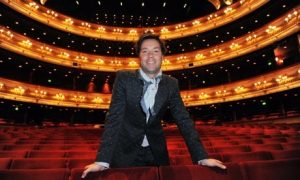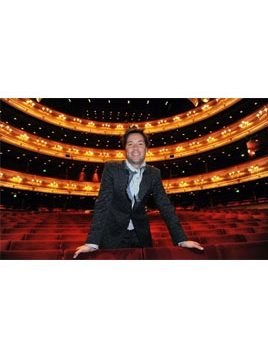FANS of the Canadian-American musician Rufus Wainwright have gotten to know him over the past two decades for his virtuosity as both a popular singer and a classical composer. By now, he has written hundreds of songs, from “Cigarettes and Chocolate Milk” (2001), which playfully catalogued his vices as a young man, to “Montauk” (2012), a love letter to husband Jörn Weisbrodt and their daughter Viva Katherine Wainwright Cohen (the granddaughter of Leonard Cohen).
 In 1998, Rolling Stone crowned him “Best New Artist,” and eight years later he earned a Grammy nomination for the sold-out re-creation of Judy at Carnegie Hall, which Judy Garland had performed in that same space 45 years earlier. Even if you haven’t followed his career, you probably know his signature sound from the movies. His cover of Cohen’s “Hallelujah” (used in 2001’s Shrek) reignited the song’s popularity, and the equally plaintive “The Maker’s Make” made its way onto the Brokeback Mountain soundtrack in 2006.
In 1998, Rolling Stone crowned him “Best New Artist,” and eight years later he earned a Grammy nomination for the sold-out re-creation of Judy at Carnegie Hall, which Judy Garland had performed in that same space 45 years earlier. Even if you haven’t followed his career, you probably know his signature sound from the movies. His cover of Cohen’s “Hallelujah” (used in 2001’s Shrek) reignited the song’s popularity, and the equally plaintive “The Maker’s Make” made its way onto the Brokeback Mountain soundtrack in 2006.
After his mother’s death in 2010, he helped to create the Kate McGarrigle Foundation, a public charity dedicated to combatting sarcoma (a rare cancer that took the folksinger’s life), and he is reportedly working on another studio album and a return to pop music. On the heels of his first opera, 2015’s Prima Donna, his second opera, Hadrian, will make its debut this fall at the Canadian Opera Company in Toronto.
This interview was conducted by email exchange in early July.
Colin Carman: In an email announcement that you were touring and revisiting “Poses” (released in 2001), you wrote: “A lot of the questions I was asking twenty years ago still haunt me today, though I may seem much more confident.” What are those questions?
Rufus Wainwright: What genre of music do I sing? Do I want to be famous? Do I want to be rich? Do I want to find true love? Do I want to just be, you know, a Peter Pan character? All things that human beings ponder all the time.
CC: Speaking of feeling “haunted,” your “Going to a Town” (from 2007’s Release the Stars) eerily prefigures the rise of Donald Trump. What do you see the role of the artist in culture today? Are non-Americans audiences receptive to your music in ways that Americans are not?
RW: Well, the artist has always been ruled by politics like everybody else on this planet. So, whether you choose to reflect that or not is irrelevant; it is reflected. So, I just feel for me personally, it’s better to be conscious and clear about what I feel is right and wrong instead of pretending like nothing’s happening. No matter what, at the end of the day, everyone will be judged. Non-American audiences are a little more sophisticated and drawn to the complexity of what I have to offer and can really let go a little bit more. American audiences know a hit when they hear one! And it’s the kind of dichotomy between building up a career and having this kind of rocket ship take off. Thankfully, I had both experiences, and they’re both equally as thrilling.
CC: I wondered if we could focus on a single song—“California”—which is my favorite of your early folk songs. You depict the Golden State as a shallow and materialistic Munchkin-land. You now reside there, reportedly, with your family. How has your attitude toward California changed since you started out?
RW: Oh, you know, I’ve always loved California. The song I wrote years ago was a bit negative, but that was only because I was cooped up in the valley, living in a dump for a few months. That makes anybody hate anywhere! But otherwise, California has been incredibly generous in beginning my career, and now being the state that I really relate to most in terms of working with other musicians. There’s a real appreciation for longevity and experience and ability there. So, I love California.
CC: What are your memories of the late great Carrie Fisher, who collaborated with you on Take All My Loves (2016)?
RW: I have a lot of memories. Too many to tell, and some of them that I will never tell, because they’re just a little too crazy! But what I miss most is her kindness and her ability to just make everybody feel like a superstar around her, and this kind of mix of simplicity and wild, complex gorgeousness.
CC: The memoir Liner Notes by your father Loudon Wainwright was a critical success last year. Would you ever write a memoir?
RW: I’m thinking about it. Between my
father’s book, and my sister [Martha] has been writing a book, and my aunt has written one as well—so I’m definitely surrounded by chapters here. I will say something at some point I’m sure, knowing myself.
CC: Your father told NPR’s Terry Gross that, as a family, you are at your best when onstage. Is that true, and, if so, why do you think that is?
RW: Well, in a sense it’s true, but only because definitely, within all of us in the family who are doing music, there’s a real dedication to excellence and to quality and to beauty, so when we would do that together, we would often release our weapons and bury our hatchets, put the shields down, and just focus on the work at hand. It brought us close in a way that, as human beings, it was harder to do. So, in a sense it’s true. When push comes to shove, we’re a pretty good bunch otherwise.
CC: While we’re on fatherhood, you have written a great deal about parent-child relations—I’m thinking of the bouncy “Beauty Mark” and the ambivalent “Dinner at Eight”—and I’m wondering what you think of parenthood now that you see this complex dynamic from a father’s perspective?
RW: It’s the best and the worst of worlds. Coming right atcha at full speed. Of course, I’m more than thrilled that I’m a dad, and I’m excited for this journey that will really last for the rest of my life. On the other hand, I don’t think I’ve ever been more frightened in my life! So, it’s very much like being reborn, for better or for worse.
CC: You recently completed an opera about the Roman emperor Hadrian and his lover Antinous. What drew you to this legendary relationship?
RW: Well, I read the book [Marguerite Yourcenar’s Memoirs of Hadrian] many years ago, even before I wrote my first opera. I knew it would make a great opera, but I didn’t necessarily feel confident about writing about the Roman empire yet, so I waited it out, and finally, after Prima Donna was completed, I felt I had the ability to move back and go into Hadrian. It was a real calling. What I’ve found with operas in general is that there are these characters that kind of spring up in your subconscious that need to be brought to life, and as long as you can listen and hear their cries and understand their complexities, you can bring them forward, and thankfully I have that gift!
CC: There are a lot of literary, specifically queer, cultural allusions sprinkled throughout your body of work. Which artists were important to you when you were growing up? Which artists do you return to?
RW: Jean Cocteau was very important to me, his films specifically. Also, his whole attitude towards the world and his toughness when confronted with ugliness. It’s interesting, the other one that I loved was Tchaikovsky. I find myself returning to him. I don’t think any other composer has captured the torment of a gay man as well as Tchaikovsky did. And somehow it rings true and hits all the bases in terms of what beauty should be like in a very typical, romantic way. It’s true and it’s beautiful, which is the best.
CC: So many musicians have you to thank as a trailblazer. What advice would you give a musician starting out today, especially an LGBT artist who, like you, doesn’t want to hide their identity just to sell records?
RW: The main thing for me is that I always worshiped the past, and now there’s kind of a disregard for what happened before. There’s a reason for that as well: there’s something in not subscribing to an oppressive society and trying to create something that’s more open and inclusive. That being said, with gay artists and looking back at the work that they created in those strenuous situations, I’ve always found myself massively impressed, mostly by their strength. To focus on the strength of these artists is the most important thing.





